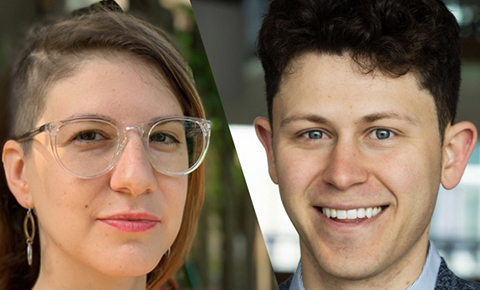Muskin, Stein Win Honorable Mention in Essay Contest

Graduate students Melanie Muskin and Andrew Stein received honorable mention in the Society for Psychological Study of Social Issues essay contest, which challenged writers to address the legacy of white supremacy and Western dominance in psychology.
Muskin and Stein, who are both studying human development and social policy, called for “epistemic pluralism,” which means staying open to many ways of perceiving, understanding, and learning.
In their own words, here’s how the essay, titled "Calling in Whiteness: Designing and Supporting Anti-Opressive Scholarship through Epistemic Pluralism." came about.
When we started our PhDs, both of us were familiar with the concept of psychology’s “WEIRD” bias, in which researchers study mainly people who are rich, white, highly educated, and from democratic industrialized societies.
But we didn’t realize the extent of the problem until we took the class “Diversity Science in Psychology" from professors Onnie Rogers and Ursula Moffitt.
This course surveyed the field of psychology across time from the early 1900s to today. It opened our eyes to how psychologists have been and can still be biased in their sampling, as well as their framing of research questions.
Too often, psychologists have conflated difference with deficit. We found ourselves questioning what is considered “normative development” and who gets to define “normal.”
Onnie and Ursula’s class also introduced us to researchers who have been a part of the solution. We learned about scholars of color, like Cydney H. Dupree of University College London; Michael J. Perez of Wesleyan University; and Moin Syed of the University of Minnesota. They’ve embraced a movement called “diversity science” and pushed for a wider range of people and methods in their work.
Researchers like Robert Guthrie, who wrote Even the Rat was White while a graduate student, inspired us to take action.
While an essay alone can’t dismantle white supremacy, we hoped our writing would be a tiny part of contributing to a wider conversation.
“Fortuitously, while writing our essay, we were also taking a research design course taught by professor Cynthia Coburn. In this class, we dug deep into epistemology, theory, methodology, and methods. Discussing Michael Crotty’s Foundations of Social Research filled in some missing pieces.
We began to see how certain ways of thinking about and studying the world lend themselves to narrow findings. Conversely, other ways of thinking about and studying the world lend themselves to more nuanced findings.
We're noticed that psychologists and education researchers tend to value and gravitate towards quantitative studies that involve combing through large numerical datasets, which sometimes fail to capture the vibrancy of everyday people or the complexities of their lives.
One of our essay’s goals is to bring greater awareness to other ways of doing research, such as phenomenology or participatory action research. By being more open to different ways of doing science, we think psychologists can embrace a more accurate understanding of human behavior that encompasses all people.
We both have backgrounds as teachers and school-based administrators in New York City. As former practitioners who are new to research, we have witnessed the huge divide between research and practice.
A big part of this gap stems from the fact that PreK-12 schoolteachers talk about issues in a very different way than the average researcher.
We hope our essay encourages psychologists and education researchers to design and discuss scholarship with openness and imagination so that practitioners, often the 'subjects' of research, can see themselves as our partners in the fight for a more just world."